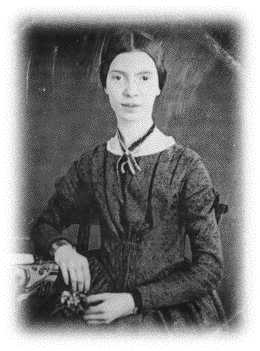The Perplexing Faith and Doubt of Emily Dickinson
"I never was with any one who drained my nerve power so much. Without touching her, she drew from me. I am glad not to live near her. She often thought me tired & seemed very thoughtful of others."
-- T.W. Higginson
"Perhaps you smile at me. I could not stop for that -- My Business is Circumference -- An ignorance, not of Customs, but if caught with the Dawn -- or the Sunset see me -- Myself the only Kangaroo among the Beauty, Sir, if you please, it afflicts me, and I thought that instruction would take it away"
-- Emily Dickinson to Higginson, July 1862
"Miss Dickinson is probably the only Anglo-American poet of her century whose work exhibits the perfect literary situation -- in which is possible the fusion of sensibility and thought. Unlike her contemporaries, she never succumbed to her ideas, to easy solutions, to her private desires."
-- Allen Tate

Some Basic Poetic Principles and Practices of Dickinson's:
- Art is not obligated to solve the contradictory
- Truth is best revealed "circumspect" or "slant." The audience must gradually adjust to its claims on the psyche.
- Truth and Beauty are conflated, even essentially one. Both are also subjective to a large extent.
- The Soul (ala' the self) is essentially at the center of reality.
- Reality and the"eye" of the creativity process do not necessarily offer the same insights.
- Abstractions are intensely felt; they are personified because the ideal must be experienced in the concrete.
- Language and poetry resonate out beyond their initial creator, even as they also continue to haunt their maker. They are almost sacramental, even eternal, outlasting those who use them.
- The poet summons up images of heaven and summer, providing great creative experience for the reader.
- Music is the language of eternity, yet it can divide us from God in its this-worldliness. It is undeniable, unexplainable, and cannot finally be captured. It is something all true poetry should aspire to.
The following is an overview of some of the great religious themes in Dickinson's work. They are mostly intended to give a context for our discussion about Dickinson and Christ. I do hope they give us a sense of her willingness to explore the contradictory, speak circumspectly, and intensely feel the abstract:
God
- "God" is often a human ideal, our attempt to develop some terms to explain to ourselves infinity or even existence. Yet, at other times, "God" is more theistic -- a personal being, however hidden, who we will face after death.
- God is sometimes a jealous, glorious being who wants our love solely; other times, he is more a tyrant and a demagogue.
- Dickinson is a self-confessed "pagan," and her faith is either weak or non-existent, yet then suddenly it haunts her again, and she desires union with the divine.
Heaven
- She is expressly concerned with enjoying the immediate, human-sized pleasures of the earth. She is not sure if heaven is just a concept, a way for us to deal with the death we will all face, or if it is a reality in the afterlife.
- Her "great flood" theme: heaven is the comfort of the poor, but it is often a cold comfort. She feels she doesn't belong there, especially if the saints (ala hypocrites) of the church will be present. She is especially suspicious of religious tradition.
- Heaven needs hell to define it, yet for her both may only be earthly realms.
Time/ Eternity/ Infinity/ Immortality
- She prefers time, the realm of the now. It is concrete and real rather than speculative. It has more permanent value.
- Immortality is more fleeting, yet also more binding.
- Time can be well-loved yet capture us.
- Immortality is often intimated yet often doubted. She cannot escape the possibility that it exists in its own right, so it must be accounted for.
- Yet death, while it is any number of symbols in Dickinson's poetry, is almost always positive: a doorway, a crowning, a gentleman, a step to something better.
Mind/ Brain/ Soul/ Self/ Spirit
- All of this, whatever it is, is the locus of existence.
- The self is imperial, a kingdom of one where one can enjoy one's own best company. Yet the mind can also be a prison, which one cannot escape except via death.
- Because the self can question itself, even interrogate itself, the soul is a kind of double mirror. It loops back upon itself in mystery.At times, the soul wishes to be freed of the body, yet at other times the soul and the body are like violin and music, essential to each other.
- Later in life, she even muses that the spirit may be a pleasant if doubtful hypothesis
- In her more optimistic moments, the soul is joined with existence and/or God.
- The soul has both infinite, expanding possibilities, yet it is condemned to a single identity, to limited consciousness. -- a "finite infinity."
In this sense then, Dickinson stands at the crossroads between Christianity, Romanticism, and the new secular realism. Her religious background in Amherst has both traditional Calvinist, as well as Old Light Wig and Unitarian impulses. She has adapted much of Romanticism's thinking about the self and creativity, yet she also deeply doubts these formulations. She has begun to listen to the voice of Darwinian evolution and Modern science in general. This is what Tate calls the "perfect literary situation". Because she stands between several eras, she may bring the vocabulary of one to bear on the still undefined ideas of another. She writes in a state of tension between epochs.
